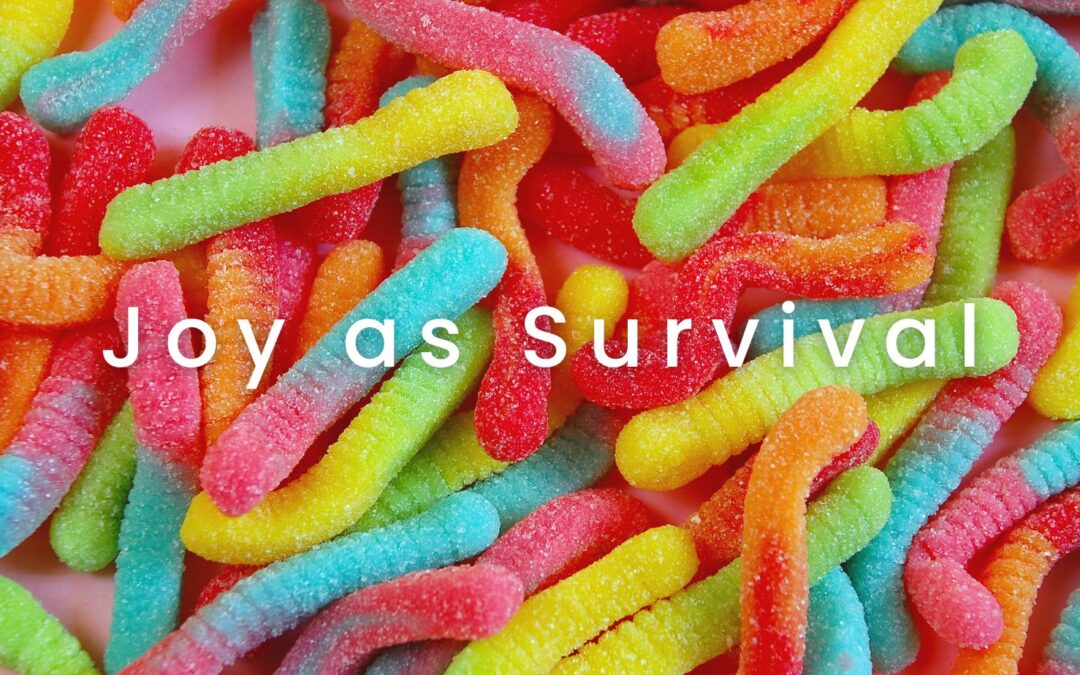
Joy as Survival
Six months. That’s how long this MS relapse has been creeping in like an unwanted houseguest that refuses to leave. At first, it was small things, my brain cutting the signal to my legs for a split second, just long enough for me to collapse in public like a puppet with cut strings. One day, my skull nearly met a brick step. My vision blurred, brain fog thickened, pain wrapped itself around me like barbed wire, and fatigue pinned me down harder and harder. My hands stiffened until even the simplest tasks became impossible.
Eventually, I couldn’t get out of bed.
That’s when despair started to set in.
I lay there watching other people live their lives through Facebook, friends travelling, working, raising families. Meanwhile, I wasn’t living anymore. I was just an observer. The depression sank deep: I window shopped for a wheelchair, I made plans for Bugsy’s future in case I gave up, I worried about the clutter I’d leave behind, and who would have to sort through my life’s mess. I began handing out my things in my head, like a ghost-in-waiting.
It felt like the end of me.
Joy vs. Happiness
Somewhere in that heaviness, I realised something important: happiness and joy are not the same thing.
Happiness is the big picture. It’s a state of being, often tied to how your life is going overall: your health, relationships, work, and finances. When those collapse, happiness often does too.
Joy is smaller, wilder, and more resilient. It doesn’t wait for life to be perfect. It slips in uninvited, a spark of light in the middle of the dark. Joy is the squirrel running across the garden wall, the sound of a bird you can’t quite name, the way coffee smells first thing in the morning.
Happiness may feel far away, but joy can still sneak into the cracks. And sometimes a single spark of joy is enough to keep you going.
But then… Spring came.
The colours outside shifted. Bees returned to flowers. Squirrels ran mad little races. I saw a gecko on the wall and found myself wondering about its tiny life, the improbable miracle of it even existing. I noticed clouds again, leaves tumbling in the wind. And it hit me: these small flashes of beauty weren’t just distractions, they were lifelines.
I’d always loved “stopping to smell the roses,” but now it became survival. A friend suggested embroidery, since crochet was no longer possible for my hands. I tried, and to my surprise, I could manage it. I started stitching bright, clumsy shapes onto my clothes. My bag of rainbow embroidery floss became a treasure chest; all those colours sparked something physical inside me, like they were rewiring my brain in the best way.
I realised I wasn’t just noticing joy anymore, I was creating it.
There was a TED Talk I stumbled across that spoke about the science of joy, how colour, shape, and playfulness trigger a response in us. And I thought: This is it. This is what’s keeping me alive. Every time I added colour, playfulness, whimsy around me, on my jeans, on my walls, in little objects scattered around my bed, it pulled me back from despair.
Why joy matters when everything feels impossible
Psychologists call these “micro-moments of joy.” Research shows that even the smallest burst, a pop of colour, a laugh, a birdsong, can reduce stress hormones, boost dopamine, and give our brains a break from the relentless loop of pain and fear. They don’t fix everything, but they tilt the scale enough to matter.
When you’re in survival mode, that tilt is everything.
Joy doesn’t have to be fireworks. Sometimes it’s embroidery thread. Sometimes it’s a squirrel. Sometimes it’s just coffee in your favourite mug, warm against your hands, proof that life still has something gentle to offer.
Your turn:
Think about one tiny thing that gave you joy this week. Not happiness, not pleasure… joy.
- Maybe it was a flash of colour.
- Maybe it was a sound.
- Maybe it was an object that made you smile.
Write it down. Notice how it feels in your body when you recall it. That’s your lifeline. Keep it close.
No matter how difficult or dark life gets, if we want to survive, if we want to stand even the smallest chance, we have got to find joy. You can either sink or swim, and joy is the kick that keeps your head above water.
For me, joy is Bugsy. It’s a gecko. It’s a bag of bright embroidery floss. It’s the stubborn belief that even here, even now, while my body is under attack, life is still offering me something worth holding onto.
Recent moments of joy
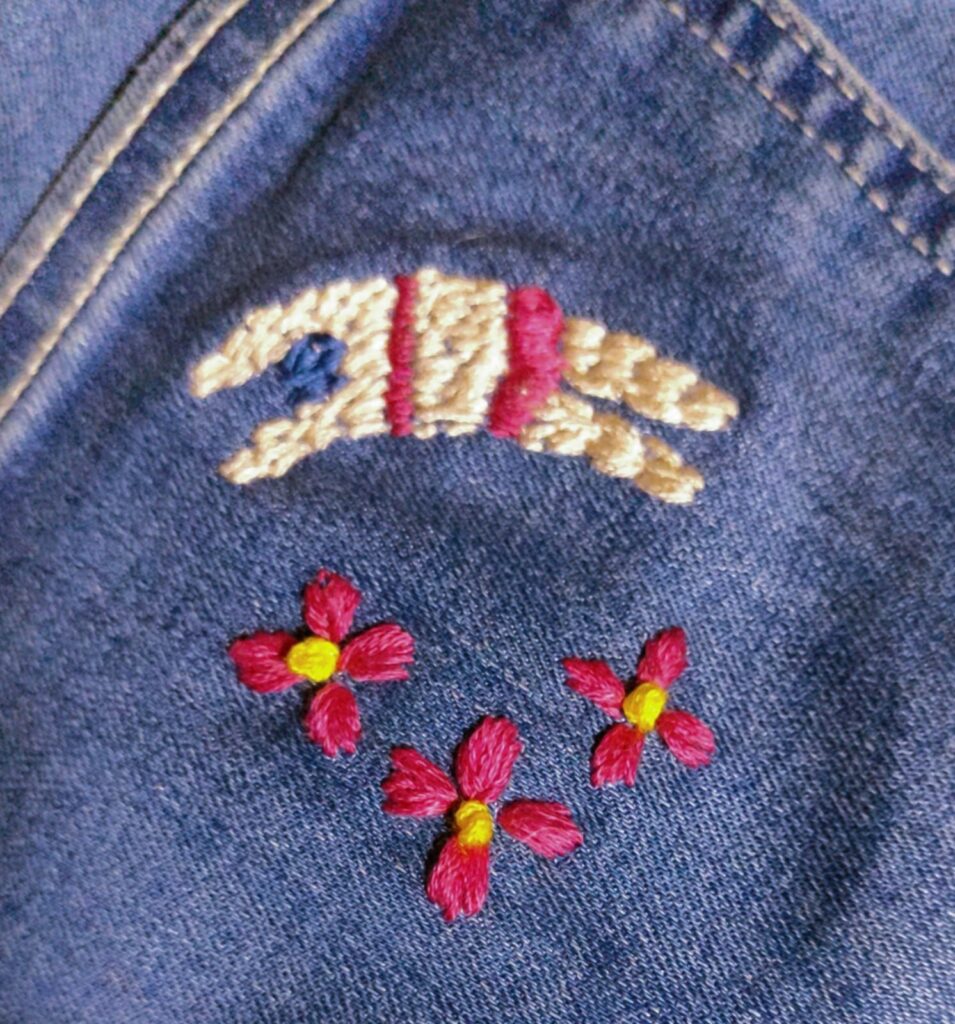

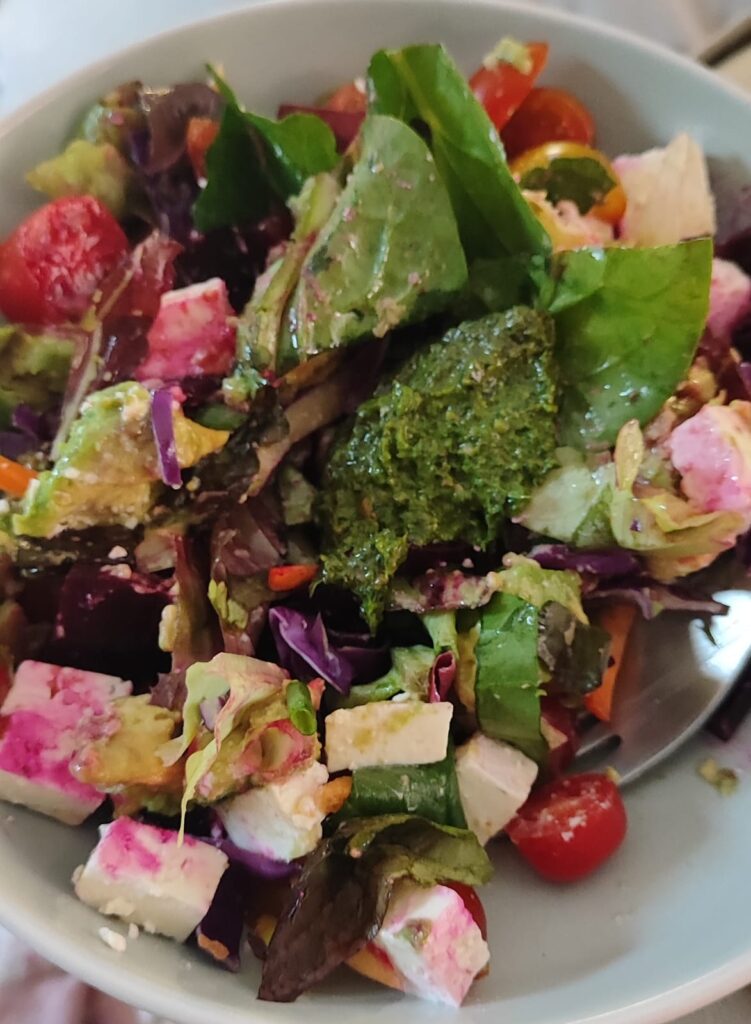

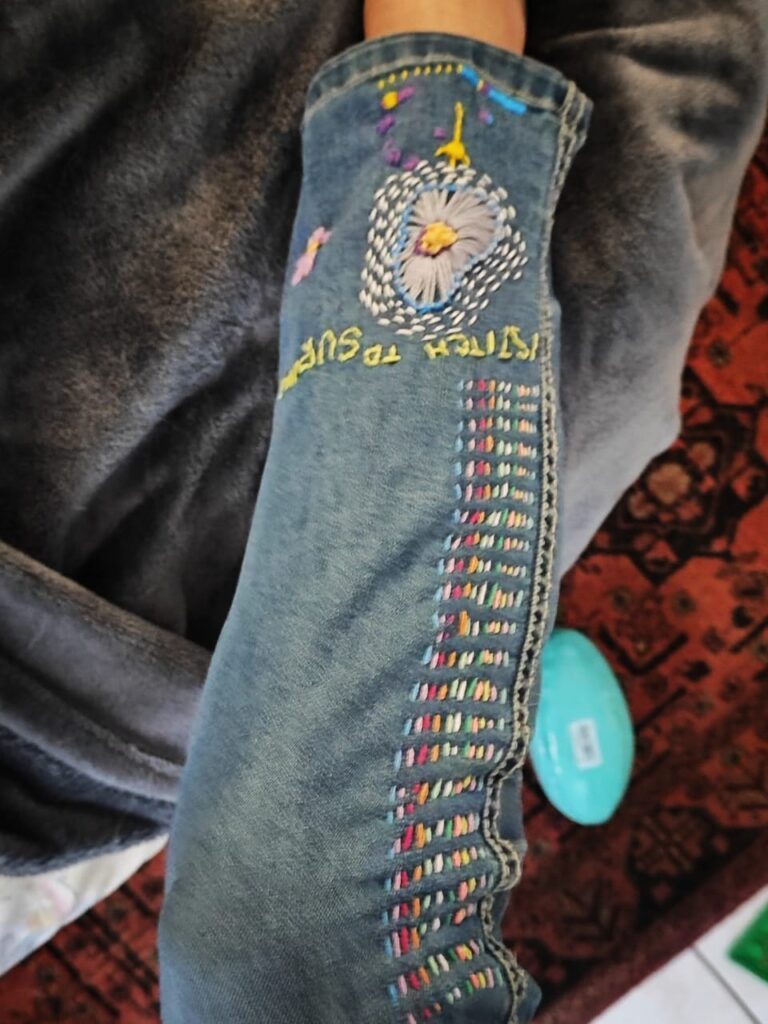

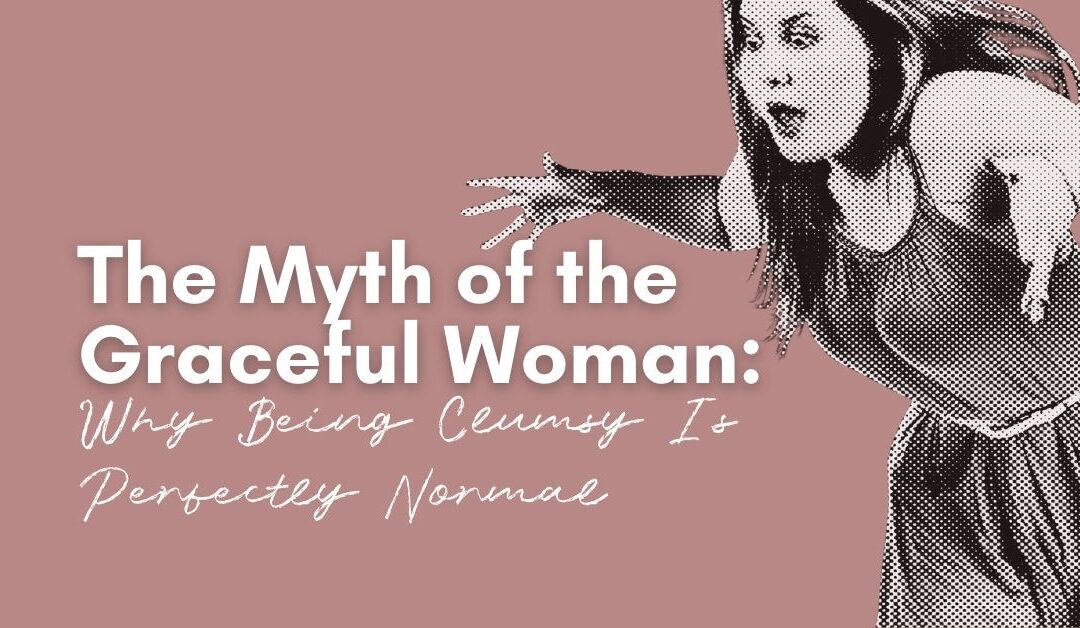
The Myth of the Graceful Woman: Why Being Clumsy Is Perfectly Normal
Somewhere out there, there must be women who glide through life in silk blouses without a single coffee stain, who never trip on their own shoelaces, and who somehow manage to eat spaghetti without looking like a toddler with finger paint.
I am not one of them. I am, proudly, a clumsy woman.
Food constantly finds its way down my cleavage. Honestly, my boobs are like a man’s beard: a net for falling snacks. I trip over invisible objects, drop things daily, and my clothes seem to rebel against me with regular wardrobe malfunctions. And don’t get me started on my hair. The minute I have both hands full, it drops over my face like a theatre curtain mid-performance.
Case in point: this week I was juggling armfuls of stuff, hair blinding me, when some man decided to launch into a conversation. Did he offer to help? Sweep the hair out of my eyes? Carry something? Of course not. He just stood there yammering, waiting for an answer while I struggled on. Honestly, if I’d had a free hand to scoop out any food from the boob-trap, I would’ve lobbed it straight at him.
Graceful? Please. Being a clumsy woman isn’t a flaw; it’s a lifestyle. And survival is my art form.
So here’s to the myth of the graceful woman. May we never meet her. May we keep tripping, spilling, wobbling, flashing a bit too much, and still showing up anyway. Because perfect is boring, but clumsy is unforgettable.

Shotgun & Stitches
Mum’s been wobbly on her legs lately, so I’ve promoted myself to co-pilot. I sit in the passenger seat, ears in the wind, keeping morale high while she panics about things I don’t understand.
Here’s what confuses me: why do humans stress so much about things they can’t control? If I can’t catch the squirrel, I move on. If the biscuit bag is empty, I nap until it magically refills. Simple.
Also, if humans can eat all the treats they want… why don’t they? Seems like a missed opportunity, if you ask me.
Meanwhile, Mum is stabbing fabric with a pointy thing, over and over again and calling it fun. Which, fine. But what’s wrong with throwing a ball?
Anyway, my advice? Don’t overthink. Ride shotgun. Nap often. Eat the damn treats.
Signed,
Bugsy 🐾

Bugsy’s Guide to a Better Life
Listen up, humans. It’s me, Bugsy. You’re overcomplicating things again. You’ve got spreadsheets, bank balances, heartbreaks, and all I’ve got is a wagging tail and a face that apparently makes strangers say “who’s a good boy?” at least five times a walk. Spoiler: it’s me.
If you’re tired, sad, or ugly-crying with swollen eyes (I won’t name names, Kate), here are my rules for a better life:
Rule 1: Nap whenever the mood strikes.
Couch, bed, sunspot on the floor, pile of dirty laundry, it doesn’t matter. Humans keep pushing through exhaustion like it’s a badge of honour. You’re cranky, drooling, and nobody likes you like that. Just nap.
Rule 2: Sniff first, ask later.
Curiosity isn’t dangerous, it’s delicious. That tree? Important memo from the neighbourhood dogs. That stranger’s bag? Potential snack stash. Stop worrying if you should, just sniff.
Rule 3: Lead with joy (wag before words).
Imagine if every time you saw someone you liked, your whole butt wiggled? That’s how I live. Drop the poker face. Wag at your people.
Rule 4: Treats are not guilty pleasures.
Humans keep whispering about carbs and calories like they’re state secrets. Newsflash: food is joy. Eat the chicken. Steal the sausage. Life is short.
Rule 5: Chase the ball, even if you never catch it.
Do the thing that makes your heart race, even if it’s ridiculous. Run after it anyway. The fun is in the chase.
Rule 6: Loyalty is everything.
If you’ve got someone who rubs your ears and fills your bowl, stick close. Don’t wander off for shinier toys. Stay with your pack.
Rule 7: Shake it off. Literally.
Got wet in the rain? Covered in mud? Bad day? Shake. It. Off. Then go roll in the grass.
That’s it, humans. Stop being weird about life. Sleep, sniff, wag, eat, chase, love, shake. Repeat.
Now, who’s got the biscuits?
~ Bugsy 🐾


